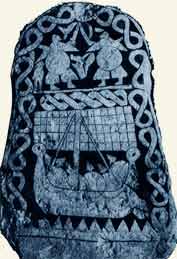
The term
'for the first time' is again mentioned in the Chronicle when describing
the wintering on Sheppey in 854/55, suggesting the events on Thanet and
Sheppey to be the first of a number of such occasions on these islands.![]() In 865, a 'great heathen army' arrives
In 865, a 'great heathen army' arrives![]()
![]() .
'Two of its leaders were the brothers Ingwaer and Healfdene, and Healfdene
at least is called a king.'
.
'Two of its leaders were the brothers Ingwaer and Healfdene, and Healfdene
at least is called a king.'![]() Royal leadership is a strong indication for the seriousness of this invasion.
The army took up winter quarters in East Anglia, the inhabitants of which
- according to the Chronicler - 'made peace with them'. It seems a likely
conclusion that the East Anglians paid tribute for the promise of departure.
Royal leadership is a strong indication for the seriousness of this invasion.
The army took up winter quarters in East Anglia, the inhabitants of which
- according to the Chronicler - 'made peace with them'. It seems a likely
conclusion that the East Anglians paid tribute for the promise of departure.
The army did depart at the end of 866 and moved onwards into Northumbria. They stayed at York for the winter. In 867, the Northhumbrians 'made peace' and 'a puppet ruler' was appointed before the Vikings moved on once more, this time to Mercia. Another winter found the Viking army in Nottingham. But Bugred, the Mercian king did not give up without resistance. He called on king Æthelred of Wessex and his brother Alfred for help in 868, and the combined forces laid siege to the Vikings in Nottingham. Still, no serious battle occurred and the Mercians finally also 'made peace' with the enemy. The Viking army returned to York in autumn of the same year and stayed there for the greater part of 869. Winter 869/70 found them at Thetford in East Anglia. This time, the East Anglians were not as peaceful. King Edmund fought, but was 'captured and savagely killed'. As the Chronicler says, the Vikings 'conquered the land'. But 'victory did not lead to immediate settlement'.
Towards the
end of 870 the army moved on once more, this time westwards to Reading,
and from there deeper into Wessex. At the beginning of 871, 'King Æthelred
and Alfred fought a series of battles against the Vikings, but despite
an apparently notable victory at Ashdown, they failed to achieve any decisive
advantage.' To make matters worse, a second Viking army ![]() arrived at Reading and joined with the first. King Æthelred died
after Easter,and Alfred ascended to the throne. King Alfred did not have
exactly what one would call an easy start. And the combined forces of
to Viking armies at large in his kingdom wer not one of his least problems.
arrived at Reading and joined with the first. King Æthelred died
after Easter,and Alfred ascended to the throne. King Alfred did not have
exactly what one would call an easy start. And the combined forces of
to Viking armies at large in his kingdom wer not one of his least problems.
|
Viking
Tour
|
| The Early Raids | Danish Armies | King Alfred and the Vikings I |
| King Alfred and the Vikings II | English Re-Conquest | King Æthelred |
| A
Danish king on the throne of England |